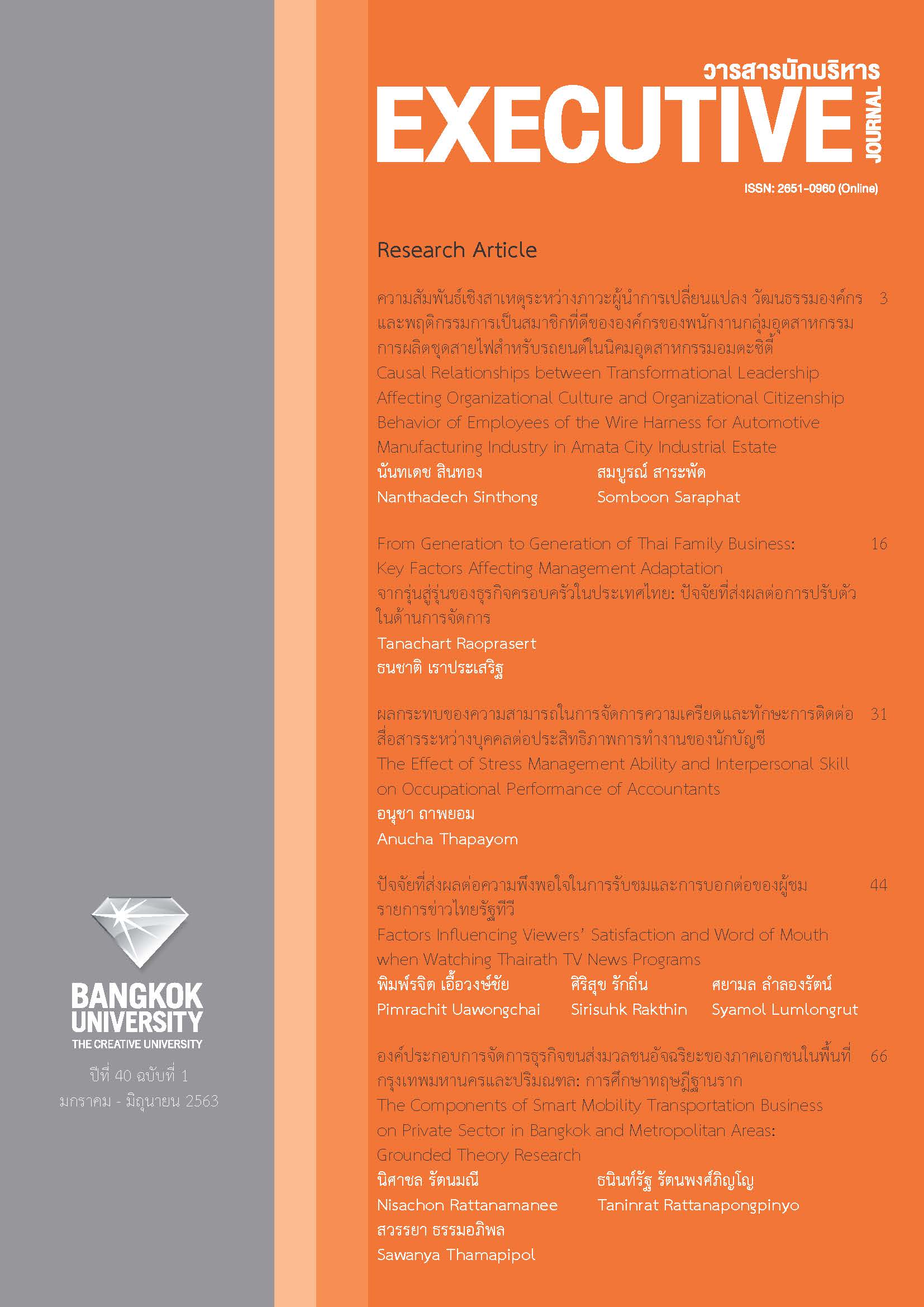The Effect of Stress Management Ability and Interpersonal Skill on Occupational Performance of Accountants
Main Article Content
Abstract
The purpose of this research is to examine the effect of stress management ability and interpersonal skill on occupational performance of accountants. Data were collected by using questionnaires from 192 accountants in Thailand. The statistics used to analyze is the multiple regression. The results revealed that two dimensions of stress management ability (stress tolerance and impulse control) have a significant positive association with occupational performance. Furthermore, two dimensions of interpersonal skill (empathy and interpersonal relationship) have a positive influence on occupational performance. On the other hand, social responsibility has no influence on occupational performance. Theoretical and professional contributions, conclusion and directions for future research were highlighted.
Article Details
The manuscript submitted for publication must be the original version, submitted only to this particular journal with no prior acceptance for publication elsewhere in other academic journals. The manuscript must also not violate the copyright issue by means of plagiarism.
References
Bar-On, R. (1997). The Bar–On emotional quotient inventory (EQ-i): Technical manual. Toronto, Canada: Multi-Health Systems.
Bar-On, R. (2006). The Bar-On model of emotional-social intelligence (ESI). Psicothema, 18, 13-25.
Churchill, G. A., Jr. (1979). A paradigm for developing better measures of marketing constructs. Journal of Marketing Research, 16(1), 64–73.
Cohen, J. (1977). Statistical power analysis for the behavioral sciences. Hillsdale, NJ: Lawrence Erlbaum.
de Boer, B., van Hooft, E., & Bakker, A. (2015). Self-control at work: Its relationship with contextual performance. Journal of Managerial Psychology, 30(4), 406-421.
Department of Business Development. (2019). Khō̜mūn phū prakō̜p wichāchīp banchī pračhamdư̄an Tulākhom 2562 [Accounting professionals information in October 2019]. Retrieved November 30, 2019, from https://www.dbd.go.th/download/article/article_20191203154524.pdf
Gentry, W. A., Weber, T. J., & Sadri, G. (2007). Empathy in the workplace: A tool for effective leadership. Paper presented at the Annual Conference of the Society of Industrial Organizational Psychology, New York.
Goleman, D. (1998). Working with emotional intelligence. New York: Bantam Books.
Hair, J. F., Jr., Black, W. C., Babin, B. J., Anderson, R. E., & Tatham, R. L. (2006). Multivariate data analysis (6th ed.). New Jersey: Prentice Hall International.
Hardjati, S., & Febrianita, R. (2019). The power of interpersonal communication skill in enhancing service provision. Journal of Social Science Research, 14, 3192-3199.
Hasle, P., Seim, R., & Refslund, B. (2019). From employee representation to problem-solving: Mainstreaming OHS management. Economic and Industrial Democracy, 40(3), 662–681.
Mikoluk, K. (2020). Interpersonal skills: How do you get what you want? Retrieved March 26, 2020, from https://www.udemy.com/blog/interpersonal-skills/
Mohammed, K., Toryila, A. S., & Saanyol, D. B. (2018). The role of interpersonal relationship on job performance among employees of Gboko Local Government Area of Benue State, Nigeria. International Journal of Social Sciences and Management Research, 4(5), 67-74.
Murali, S. B., Basit, A., & Hassan, Z. (2017). Impact of job stress on employee performance. International Journal of Accounting, Business & Management, 5(2), 13-33.
Nunnally, J. C., & Bernstein, I. H. (1994). Psychometric theory (3rd ed.). New York, NY: McGraw-Hill.
Oommen, N. M., & Philip, R. A. (2016). Self-concept and stress tolerance among hearing impaired high school students. International Journal of Current Research, 8(3), 28822-28825.
Palethorpe, M. (2006). Are you emotional but intelligent or are you emotionally intelligent? Engineering Management Journal, 16(1), 11-13.
Pediwal, G. L. (2011). Excessive stress and its impact on employee behavior. Journal of Global Economy, 1(1), 13-40.
Romi, A., Cook, K. A., & Dixon-Fowler, H. R. (2018). The influence of social responsibility on employee productivity and sales growth: Evidence from certified B corps. Sustainability Accounting, Management and Policy Journal, 9(4), 392-421.
Salovey, P., & Mayer, J. D. (1990). Emotional intelligence. Imagination, Cognition and Personality, 9(3), 185-211.
Sanitlou, N., Sartpetch, W., & Napha-arak, Y. (2019). Kān khamnūan khanāt tūayāng dūai prōkrǣm samretrūp G*Power [Sample size calculation using G*Power program]. Journal of Suvarnabhumi Institute of Technology, 5(1), 496-507.
Sō̜ngphanhārō̜ihoksipsām Khon Thai khrīat rư̄arang khāchaičhāi raksā phung yīsipʻet . hā mư̄nlān ! [2020 Thais are stressed, Medical expenses rose by 21.5 billion]. (2019, December 29). Manager Online. Retrieved January 20, 2020, from https://mgronline.com/daily/detail/9620000123415
Tan, A., Muskat, B., & Johns, R. (2019). The role of empathy in the service experience. Journal of Service Theory and Practice, 29(2), 142-164.
Thapayom, A., Ussahawanitchakit, P., & Boonlua, S. (2018). Effect of emotional intelligence orientation on audit sustainability of Certified Public Accountants (CPAs) in Thailand. Journal of Accountancy and Management, 10(3), 1-16.
Victor, A., & Akintokunbo, O. (2018). Stress management and employee performance of deposit money banks in Port Harcourt, Nigeria. American Journal of Humanities and Social Sciences Research, 2(12), 41-49.
Wafula, M., & Nyaboga, E. (2019). Stress management and employee performance: Use of psychotherapy as mitigation in selected schools (School of business and economics and Health sciences) in Kisii University, Kenya. Merit Research Journal of Business and Management, 7(3), 19-27.


